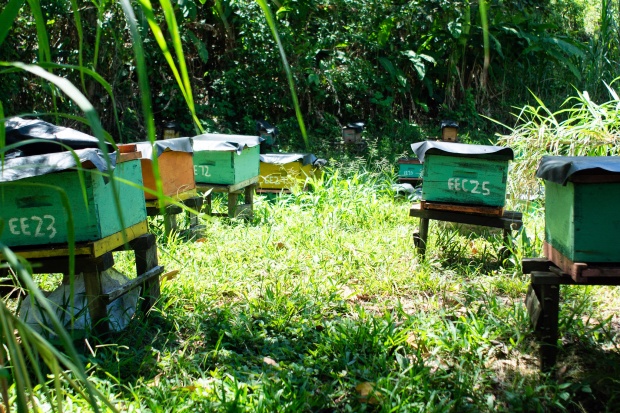Re-assessing agroecology’s role in sustainable agriculture. Integrating agroecology and climate-smart agriculture in CCAFS activities.
The CGIAR Research Program on Climate Change, Agriculture and Food Security (CCAFS) is committed to tackling humankind’s greatest challenges in the 21st century: food security, adaptation to climate change, and mitigation of climate change. Climate-smart agriculture (CSA) is a foundational thread woven throughout the CCAFS program.
However, it is not the only framework for the future of agriculture. Agroecological approaches to land management provide a related but different set of principles.
In a recent study, Agroecology and Climate Change: A case study of the CCAFS Research Program, Nadine Andrieu (CIRAD-CIAT) and Yodit Kebede (WUR & UMR Eco&Sols) assessed CCAFS’s alignment with principles of agroecology using the Food and Agriculture Organization of the United Nations’ (FAO) 10 Elements of Agroecology as a framework. The authors reviewed documents and conducted interviews with CCAFS Flagship leaders and a keyword study of CCAFS research.
They concluded that agroecology was not a key concept in the design of CCAFS activities. However, many promoted practices were agroecological in nature and correlated with several of the FAO’s 10 Elements of Agroecology.
Related Articles: Sustainable Agriculture | Sustainable Agriculture in Commercial Farming | Rethinking New Technology for Small Farmers
Agroecology & climate-smart agriculture (CSA)
Climate-smart agriculture is an approach to agriculture that addresses interlinked challenges of food security and climate change. CSA seeks three core outcomes:
- Sustainably increase agricultural productivity, to support equitable increases in farm incomes, food security and development
- Adapt and build the resilience of agricultural and food security systems to climate change at multiple levels
- Reduce greenhouse gas emissions from agriculture (including crops, livestock and fisheries)
Agroecology is an approach to land management that applies ecological and social concepts to the design and management of food and agricultural systems. It seeks to optimize the interactions between plants, animals, humans and the environment while considering crucial social aspects for a sustainable and just food system.
The FAO’s 10 Elements of Agroecology
- Diversity, synergies, efficiency, resilience, recycling, co-creation and knowledge sharing (describe common characteristics of agroecological systems, foundational practices and innovation approaches)
- Human and social values and culture and food traditions (context features)
- Responsible governance and circular and solidarity economy (enabling environment)
Comparing CSA and agroecology
Some proponents for agroecology reason that CSA does not do enough to protect the environment and vulnerable populations. Not all climate-smart practices follow agroecological principles. For example, minimum tillage practices combined with herbicides rather than mechanical methods to remove weeds may be considered climate-smart, but not agroecological.
It’s argued that CSA pays too much attention to new methods and technology and not enough to traditional practices and underlying mechanisms that have enabled existing systems to resist or recover from usual climate stressors. Additionally, for some experts, there is not enough consideration of the social resilience of the rural communities that manage agroecosystems.
On the other hand, there is skepticism about the effectiveness of agroecology to feed a rapidly growing population sustainably and a lack of explicit attention to climate change.
There is value to using multiple frameworks to inform action. There is an extensive literature on agroecology’s role in the resilience of farming systems and CSA’s role in facilitating support from institutions for change in agricultural systems. Both are necessary for the transformation of agriculture.
CSA and agroecology in CCAFS
Although the authors of the study found that CCAFS activities were not designed to follow agroecology principles, many promoted practices that were agroecological, and several of the 10 FAO Elements were addressed:
- Efficiency, recycling, co-creation and sharing of knowledge were the most commonly addressed and explored of the 10 FAO Elements.
- Resilience, diversity, human and social values, and responsible governance were addressed but focused on agricultural production rather than the entire food system.
- Similarly, socioeconomic resilience and synergies between on-farm and off-farm activities were not a focus.
- The resilience of agroecosystems to pests and diseases were not as incorporated in activities.
- In research, diversity was considered at plot and farm-scale, but was not fully considered at the landscape scale or in economic activities.
- Human and social values were considered through the lens of gender inclusion and participatory and multi-stakeholder processes. It was also indirectly considered by CCAFS’ strong participatory approach to research and interventions.
Going Forward
Agroecology promotes fundamental changes in the way food is produced and consumed by focusing on people. It encourages fair economic conditions for all contributors to the value chain, which requires political governance to balance ecological, economic and social factors of food systems. In addition, agroecology promotes a system-thinking approach to meet the complexity of climate change adaptation and mitigation within the food system. The authors make the following recommendations for future CCAFS interventions:
- Encourage the inclusion of agroecological principles in the implementation of nationally determined contributions (NDCs) to the Paris Agreement ;
- Strengthen system thinking for food system transformation;
- Strengthen landscape-level activities;
- Develop projects for circular and solidarity economies; and
- Use climate information services to support the implementation of agroecological practices.
About the author: Sadie Shelton is the Communications Officer for the CCAFS Low Emissions Development Flagship.
Editor’s Note: The opinions expressed here by Impakter.com columnists are their own, not those of Impakter.com.











